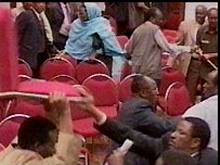 [Asharq al-Aswat] The Sadrist trend and its leader, Moqtada al-Sadr, who remains in Tehran, are currently being courted by Iyad Allawi's Iraqiya bloc and Nuri al-Maliki's State of Law coalition, as both sides attempt to form a majority government. Delegations from the Iraqiya bloc and the State of Law coalition arrived in Tehran to meet with al-Sadr.
[Asharq al-Aswat] The Sadrist trend and its leader, Moqtada al-Sadr, who remains in Tehran, are currently being courted by Iyad Allawi's Iraqiya bloc and Nuri al-Maliki's State of Law coalition, as both sides attempt to form a majority government. Delegations from the Iraqiya bloc and the State of Law coalition arrived in Tehran to meet with al-Sadr.Prior to this, Iraqi President Jalal Talabani, and Vice President Adil Abdul Mahdi, both visited Iran on the eve of the election results, although it was announced that this visit came at the invitation of the Iranian government, and was an invitation for the Kurdish President and Shiite Vice President to participate in the Iranian Nowruz celebrations.
Sources informed Asharq Al-Awsat that negotiations with the Sadrist trend began before delegations were sent to Iran, and that Karar al-Khafaji, Chief of the Political Committee of the Sadrist Trend, met with a delegation from the State of Law coalition, and has been in communication with the Iraqiya bloc.
The Sadrist trend is a member of the Shiite National Iraqi Alliance, which won a total of 70 parliamentary seats at the recent Iraqi elections; however the Sadrist trend won 39 of these seats making it by far the most influential party in this alliance.
Senior sources within the Sadrist trend revealed that it is being represented by Qusay al-Suhail in the talks that are taking place in Tehran. Al-Suhail was the Sadrist Prime Ministerial candidate, and is a prominent figure in the trend. As for the State of Law coalition, it has sent Ali al-Adeeb, a senior member of the Dawa Party to negotiate on behalf of Iraqi Prime Minister Nuri al-Maliki. The second State of Law coalition negotiator is former First Deputy Speaker of the Council of Representatives Sheikh Khalid al-Attiya, although it is not known whether Sheikh al-Attiyia traveled to Tehran with Adeeb, or whether he remains in Iraq. Sources indicate that the Sadrists have so far been successful in managing the negotiation file.
A senior member of the Sadrist trend, Nassar al-Rubaie, confirmed to Asharq Al-Awsat that the Sadrist trend is not vetoing any prime ministerial candidate. However, senior officials close to al-Sadr contradicted this, telling Asharq Al-Awsat that there is a red line with regards to al-Maliki and that at this stage the Shiite alliance "is more important than names." The sources say that the National Iraqi Alliance is capable of choosing a replacement for al-Maliki "for the ultimate goal."
With regards to the National Iraqi Alliance, the Sadrist leadership confirmed that there are certain pre-requisites that cannot be compromised or put aside. One senior Sadrist official who spoke to Asharq Al-Awsat on the condition of anonymity said that "the pre-requisites [for forming a majority government] are national partnership in the management of the state, developing institutes on the basis of competence and moving away from quotas and favoritism, and respecting facts and not marginalizing others."
For his part, Mohamed al-Bahadli, al-Sadr's chief representative in southern Iraq, told Asharq Al-Awsat that "dialogue between the victorious blocs and the others has begun, and everybody knows that we are not with any component or against any component, we are with everybody in order to establish a partnership government."
He added "we do not want to fall into the same mistakes that occurred in the past and which cost the Iraqi people a lot, today we are working to resolve all of these errors through dialogue and developing mechanisms to ensure the political process in a way that puts Iraq at the forefront."
While the Shiite movements have turned their attention to Tehran, Baghdad, and Najaf, the Sunni leadership are holding meetings and communicating [in order to form a majority government]. Leader of the Iraqi Accord Front, Iyad al-Samarrai, met with three senior Iraqiya bloc figures in the past 48 hours. Al-Samarrai met with Iraqi Deputy Prime Minister Rafi al-Issawi, the leader of the Tajdid List Tariq al-Hashimi, as well as Osama Nujaifi.

 Iraq's Sunni Arab politicians were in disarray on Sunday after the deputy parliament speaker announced that they had failed to agree a candidate to propose for the post of parliamentary speaker. MPs from the largest Sunni bloc were preparing to put forward
Iraq's Sunni Arab politicians were in disarray on Sunday after the deputy parliament speaker announced that they had failed to agree a candidate to propose for the post of parliamentary speaker. MPs from the largest Sunni bloc were preparing to put forward